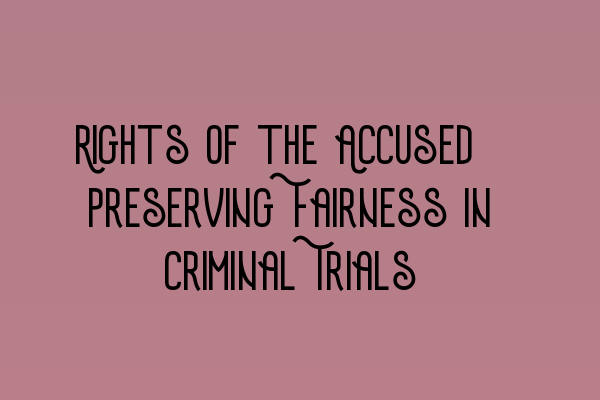Rights of the Accused: Preserving Fairness in Criminal Trials
In the criminal justice system, every accused individual is entitled to certain fundamental rights to ensure fairness throughout the trial process. These rights not only protect the accused but also serve to uphold the integrity of the legal system as a whole. As legal professionals at SQE Criminal Law & Practice Law UK, we firmly believe in safeguarding these rights and advocating for justice for all.
Giving the Accused a Fair Hearing
One of the primary rights accorded to the accused is the right to a fair hearing. This means that every individual facing criminal charges has the right to be heard and to present their case before an impartial judge or jury. This fundamental principle ensures that justice is not only done, but it is seen to be done.
Throughout the trial process, it is crucial to ensure that the accused is provided with adequate legal representation. Effective legal counsel enables the accused to understand their rights, assists in building a robust defense, and helps level the playing field against well-resourced prosecution teams. At SQE Criminal Law & Practice Law UK, we offer comprehensive SQE 1 Preparation Courses to equip aspiring criminal lawyers with the necessary skills to provide excellent legal representation.
Presumption of Innocence
Another vital aspect of preserving fairness in criminal trials is the presumption of innocence. It is a fundamental principle that every accused person is presumed innocent until proven guilty beyond a reasonable doubt. This presumption ensures that the burden of proof rests squarely on the prosecution, and the accused is not required to prove their innocence.
To hold the prosecution accountable and ensure that the accused’s rights are protected, it is essential to follow rigorous procedures for collecting and presenting evidence. These procedures help prevent the introduction of unreliable or unlawfully obtained evidence, further upholding the presumption of innocence. As part of our commitment to preparing future legal professionals, we offer specialized SQE 2 Preparation Courses that cover evidence law in detail.
Protection Against Self-Incrimination
The right against self-incrimination is another crucial protection available to the accused. It ensures that individuals cannot be compelled to testify against themselves or provide evidence that may be self-incriminating. This right encompasses the privilege against self-incrimination and the right to remain silent.
At SQE Criminal Law & Practice Law UK, we recognize the importance of properly advising clients on their rights. We train our graduates to uphold the principle of protecting against self-incrimination and assist their clients in making informed decisions during the trial process. Our comprehensive SQE 1 Practice Exam Questions provide aspiring lawyers with the opportunity to practice applying this knowledge in a realistic setting.
Conclusion
Fairness in criminal trials is of paramount importance to ensure justice is served. By upholding the rights of the accused, we maintain the integrity of the legal system and protect individuals from wrongful convictions. At SQE Criminal Law & Practice Law UK, we are dedicated to training future solicitors and advocates who will champion the preservation of these rights. For more information about the SQE exams, SRA SQE Exam Dates are available for aspiring legal professionals to plan their preparation accordingly. Together, let us strive for a criminal justice system that exemplifies fairness, integrity, and equality.
